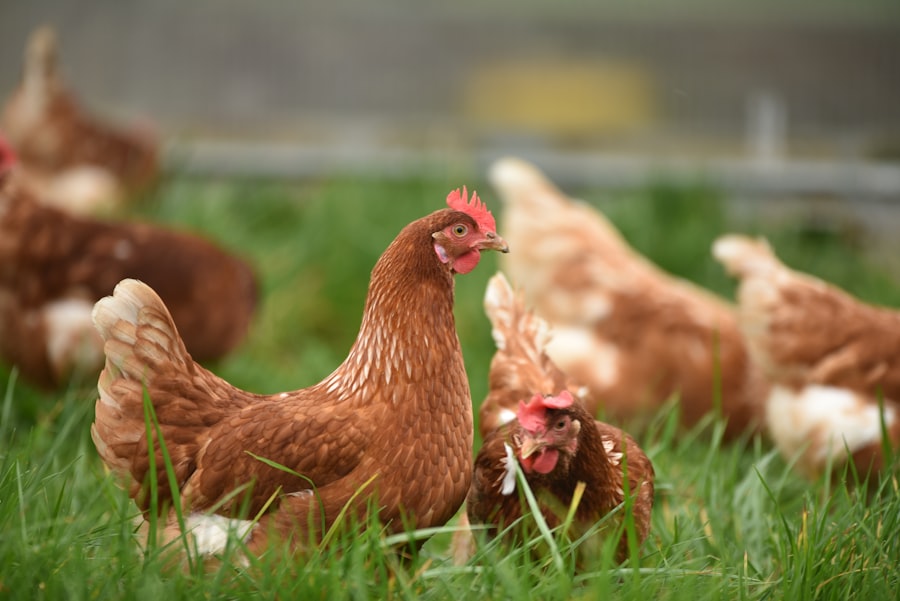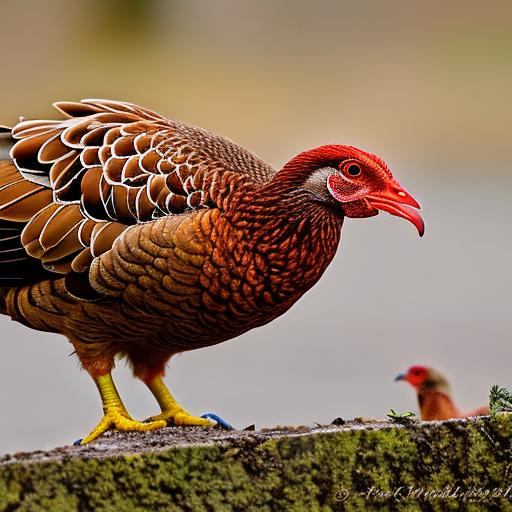Keeping turkeys and chickens together in a chicken coop is a topic that often sparks debate among poultry enthusiasts. Some people believe that turkeys and chickens can coexist peacefully, while others have concerns about the compatibility of these two species. In this article, we will explore the behavior, nutritional requirements, space considerations, and other factors that need to be taken into account when considering keeping turkeys and chickens together.
One common misconception about keeping turkeys and chickens together is that they will automatically get along. While it is possible for these two species to coexist harmoniously, it is not always the case. Turkeys and chickens have different behaviors, nutritional needs, and space requirements, which can lead to conflicts if not properly managed. It is important to understand these differences and take appropriate measures to ensure the well-being of both species.
Key Takeaways
- Turkeys and chickens can coexist in a chicken coop, but it requires careful consideration and management.
- Turkeys and chickens have different behaviors and nutritional requirements that need to be taken into account.
- Space considerations are important, with turkeys needing more room than chickens.
- A secure chicken coop is essential for both turkeys and chickens to prevent disease transmission and parasite infestations.
- Managing flock dynamics is crucial to avoid aggression and bullying between turkeys and chickens.
Understanding the Behavior of Turkeys and Chickens
In the wild, turkeys and chickens have different behaviors that are adapted to their respective environments. Turkeys are social animals that live in flocks and have a hierarchical structure. They are known for their curious nature and can be quite vocal. Chickens, on the other hand, are also social animals but tend to form smaller groups. They have a pecking order within their flock and use various vocalizations to communicate with each other.
In a domestic setting, the behavior of turkeys and chickens may change slightly. Turkeys may become more docile and less inclined to roam over large areas as they would in the wild. Chickens may also adapt to their environment by becoming more tolerant of confinement. However, it is important to note that these changes in behavior may vary from individual to individual.
Despite these differences, there are also similarities in the behavior of turkeys and chickens. Both species engage in dust bathing as a way to keep themselves clean and free of parasites. They also have a natural instinct to roost at night, although turkeys prefer to roost in trees while chickens prefer elevated perches. Understanding these behaviors can help in providing appropriate housing and enrichment for both species.
Differences in Nutritional Requirements
Turkeys and chickens have different nutritional needs, and it is important to provide a balanced diet for both species. Turkeys require a higher protein content in their diet compared to chickens. This is because turkeys are larger birds and have a faster growth rate. They also have higher requirements for certain vitamins and minerals, such as vitamin E and selenium.
If the nutritional requirements of turkeys are not met, it can lead to health problems such as poor growth, feather abnormalities, and weakened immune system. Similarly, if chickens are not provided with a balanced diet, they may experience reduced egg production, poor feather quality, and increased susceptibility to diseases.
To ensure that both turkeys and chickens receive the nutrients they need, it is important to provide them with appropriate feed formulated specifically for their species. It is also advisable to consult with a poultry nutritionist or veterinarian to determine the specific nutritional requirements of your flock.
Space Considerations: How Much Room Do Turkeys and Chickens Need?
Providing adequate space is crucial for the well-being of both turkeys and chickens in a chicken coop. Overcrowding can lead to health problems, stress, aggression, and behavioral issues. Turkeys require more space than chickens due to their larger size and more active nature.
As a general guideline, it is recommended to provide at least 10 square feet of space per turkey and 4 square feet of space per chicken in the coop. This calculation should take into account both the indoor and outdoor areas available for the flock. It is important to note that these are minimum recommendations, and providing more space is always beneficial.
In addition to the overall space, it is also important to provide enough perches and nesting boxes for both turkeys and chickens. Turkeys prefer to roost on elevated perches, while chickens prefer lower perches. Providing multiple perches at different heights can help accommodate the preferences of both species.
The Importance of a Secure Chicken Coop for Both Turkeys and Chickens
A secure chicken coop is essential for the safety and well-being of both turkeys and chickens. Predators such as raccoons, foxes, and birds of prey can pose a threat to the flock. A secure coop with sturdy walls, a predator-proof roof, and strong fencing can help protect the flock from these predators.
In addition to protecting the flock from predators, a secure coop also prevents the flock from escaping and causing damage. Turkeys are known for their ability to fly short distances and may be more prone to escaping compared to chickens. Ensuring that the coop is properly secured with no gaps or holes can help prevent escape attempts.
It is also important to consider the ventilation needs of both turkeys and chickens when designing a secure coop. Proper ventilation helps maintain good air quality and prevents the buildup of moisture, which can lead to respiratory problems. Providing windows or vents that can be opened or closed as needed can help regulate the airflow in the coop.
Feeding Time: Can Turkeys and Chickens Eat Together?

Feeding time can be a potential source of conflict between turkeys and chickens if not managed properly. Turkeys have a tendency to be more aggressive during feeding and may bully smaller chickens. This can lead to stress, injuries, and reduced feed intake for the chickens.
To prevent aggression and bullying during feeding time, it is recommended to provide separate feeding stations for turkeys and chickens. This can be achieved by using different feeders or by placing feeders at different heights to accommodate the size difference between the two species.
It is also important to ensure that both turkeys and chickens have access to fresh water at all times. Turkeys have a higher water requirement compared to chickens, so providing multiple water sources can help prevent competition and ensure that all birds have access to water.
Health Concerns: Disease Transmission and Parasites
Keeping turkeys and chickens together in a chicken coop can pose potential health risks due to the transmission of diseases and parasites between the two species. Turkeys are more susceptible to certain diseases, such as blackhead disease, which can be transmitted to chickens. Chickens, on the other hand, can carry parasites such as lice and mites, which can affect turkeys.
To prevent disease transmission and parasite infestations, it is important to practice good biosecurity measures. This includes regularly cleaning and disinfecting the coop, providing separate dust bathing areas for turkeys and chickens, and monitoring the flock for any signs of illness or parasites.
It is also advisable to quarantine new birds before introducing them to the existing flock. This helps prevent the introduction of diseases or parasites from outside sources. Quarantine should be done in a separate area away from the main flock for a period of at least 30 days.
Nesting and Roosting Arrangements for Turkeys and Chickens
Turkeys and chickens have different nesting and roosting habits, and it is important to provide appropriate arrangements for both species. Turkeys prefer to nest on the ground, while chickens prefer elevated nesting boxes. Providing separate nesting areas for turkeys and chickens can help prevent conflicts over nesting space.
When it comes to roosting, turkeys prefer to roost in trees or on elevated perches, while chickens prefer lower perches. Providing multiple perches at different heights can help accommodate the preferences of both species. It is also important to ensure that the perches are wide enough to support the size of the birds and are made of materials that are comfortable for them to grip.
Managing Flock Dynamics: Avoiding Aggression and Bullying
Aggression and bullying can occur between turkeys and chickens, especially during the integration process or when there is a significant size difference between the two species. It is important to manage flock dynamics to prevent these issues and ensure the well-being of all birds.
When introducing new birds to an existing flock, it is recommended to do so gradually and in a controlled manner. This can be done by using temporary barriers or wire mesh to separate the new birds from the existing flock while allowing them to see and interact with each other. This helps reduce aggression and allows the birds to establish a pecking order without causing harm.
Monitoring the flock’s behavior is also important in managing flock dynamics. Signs of aggression or bullying include excessive pecking, feather loss, injuries, and stress. If any of these signs are observed, it may be necessary to separate the birds temporarily or make adjustments to the housing or feeding arrangements.
Is Keeping Turkeys with Chickens Right for Your Flock?
In conclusion, keeping turkeys and chickens together in a chicken coop can be done successfully with proper planning and management. It is important to consider the behavior, nutritional requirements, space considerations, and other factors that may affect the compatibility of these two species.
Before deciding to keep turkeys and chickens together, it is important to assess your own flock’s needs and behavior. Consider factors such as the size of your coop, the availability of outdoor space, and the resources you have for providing separate feeding stations, nesting areas, and roosting arrangements.
If you decide to keep turkeys and chickens together, it is recommended to consult with experienced poultry keepers or seek advice from poultry experts. They can provide guidance on specific issues related to your flock and help ensure the well-being of both turkeys and chickens.
For further information on keeping turkeys and chickens together in a chicken coop, there are various resources available online, including forums, websites, and books dedicated to poultry keeping. These resources can provide more in-depth information on specific topics and help you make informed decisions for your flock.
If you’re considering keeping turkeys with chickens, it’s important to understand the dynamics between these two poultry species. While they can coexist, there are certain factors to consider. To learn more about this topic, check out this informative article on Poultry Wizard: Can I Keep Turkeys with Chickens? This article provides valuable insights and tips on successfully housing turkeys and chickens together, ensuring their well-being and compatibility.
FAQs
Can turkeys and chickens be kept together?
Yes, turkeys and chickens can be kept together in the same coop or pen.
Do turkeys and chickens get along?
Turkeys and chickens can get along, but it depends on the individual birds. Some turkeys may be aggressive towards chickens, while others may be more docile.
What are the benefits of keeping turkeys and chickens together?
Keeping turkeys and chickens together can provide companionship for both species and can also help with pest control in the coop or pen.
What are the potential problems of keeping turkeys and chickens together?
Turkeys may be carriers of diseases that can be harmful to chickens, so it is important to keep the coop or pen clean and to monitor the health of all birds. Additionally, turkeys may require different feed and housing requirements than chickens.
What should I consider before keeping turkeys and chickens together?
Before keeping turkeys and chickens together, consider the space requirements, feed and housing needs, and potential health risks. It is also important to introduce new birds slowly and monitor their behavior towards each other.
Meet Walter, the feathered-friend fanatic of Florida! Nestled in the sunshine state, Walter struts through life with his feathered companions, clucking his way to happiness. With a coop that’s fancier than a five-star hotel, he’s the Don Juan of the chicken world. When he’s not teaching his hens to do the cha-cha, you’ll find him in a heated debate with his prized rooster, Sir Clucks-a-Lot. Walter’s poultry passion is no yolk; he’s the sunny-side-up guy you never knew you needed in your flock of friends!







